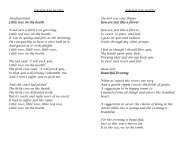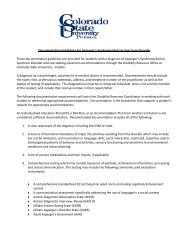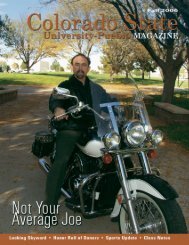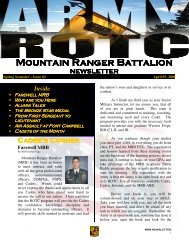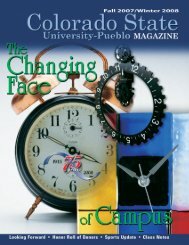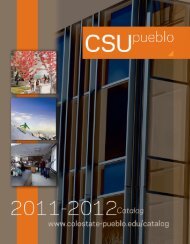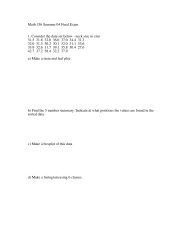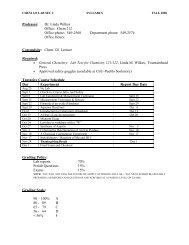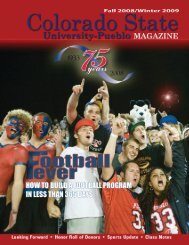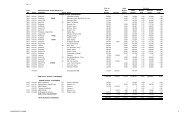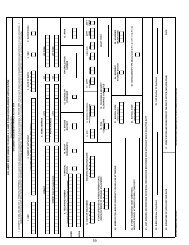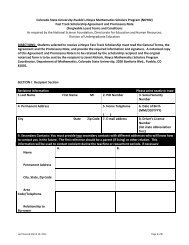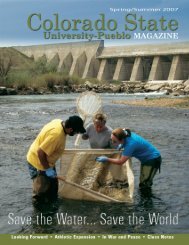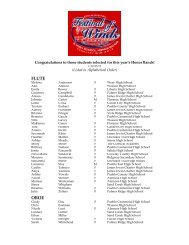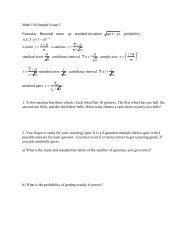2007-2008 Catalog (PDF) - Colorado State University-Pueblo
2007-2008 Catalog (PDF) - Colorado State University-Pueblo
2007-2008 Catalog (PDF) - Colorado State University-Pueblo
You also want an ePaper? Increase the reach of your titles
YUMPU automatically turns print PDFs into web optimized ePapers that Google loves.
CSU-<strong>Pueblo</strong><br />
EN 215 Intro to Indus & Sys Engineering ...3<br />
EN 343 Engineering Economy ...................3<br />
PLUS three of the following:<br />
EN 420 Simulation Experiments.................4<br />
EN 439 Time and Motion Studies...............2<br />
EN 440 Safety Engineering ........................3<br />
EN 441 Engineering of Manufacturing<br />
Processes......................................4<br />
EN 443 Quality Control and Reliability........3<br />
EN 471 Operations Research.....................3<br />
EN 473 Computer Integrated<br />
Manufacturing................................3<br />
EN 475 Facility, Planning and Design ........3<br />
EN 477 Operations Planning and Control...3<br />
_____________<br />
TOTAL 21-24<br />
Outcomes Assessment Activities<br />
The BSE-Mechatronics and BSIE programs and the<br />
courses in each program are designed to support the<br />
Program Outcomes listed for each degree. Each<br />
program has an Advisory Board that meets annually<br />
and the input from those Boards is used to revise the<br />
programs. The Department also uses the following<br />
assessment activities:<br />
• During the final semester of study, all engineering<br />
students are required to demonstrate their ability<br />
to apply and integrate the skills and knowledge<br />
learned in the program by producing a capstone<br />
engineering design project. This project must<br />
incorporate subject material covered in two or<br />
more courses in the student’s major, involve<br />
knowledge or skill not learned in a class thus<br />
demonstrating the student’s ability to engage in<br />
life long learning, involve reflection on the impact<br />
of the proposed solution in a global and societal<br />
context, and be presented in written and oral<br />
reports to demonstrate the student’s communication<br />
skills.<br />
• All senior engineering studies are required to take<br />
the Fundamentals of Engineering (FE) exam<br />
administered by the <strong>Colorado</strong> <strong>State</strong> Board of<br />
Registration for Professional Engineers, on a<br />
regularly scheduled examination date. Students<br />
must take the exam to be eligible to graduate,<br />
although the results of the exam will not affect<br />
GPA or graduation.<br />
EXERCISE SCIENCE, HEALTH<br />
PROMOTION, AND RECREATION<br />
DEPARTMENT<br />
Department Chair: Foust<br />
Faculty: L. Clark, R. Clark, Conroy, Dallam, Martin,<br />
Rochester, Smith, Stuyt<br />
The mission of the Department of Exercise Science,<br />
Health Promotion, and Recreation is to prepare<br />
students for professional positions and leadership<br />
roles in Exercise Science, Health Promotion, and<br />
Recreation through experiential educational<br />
opportunities that promote wellness and healthy<br />
lifestyles. Graduates earn a Bachelor of Science<br />
degree in Exercise Science, Health Promotion, and<br />
Recreation (EXHPR).<br />
The BS in Exercise Science, Health Promotion, and<br />
Recreation (EXHPR) program currently includes six<br />
emphases of study:<br />
• Athletic Training<br />
• General Exercise Science<br />
• Health Promotion Wellness<br />
• Physical Education K-12 Teacher Preparation<br />
• Community/Commercial Recreation<br />
• Outdoor Adventure Leadership<br />
Department Goals<br />
• Provide students with a broad-based theoretical<br />
foundation supported by laboratory and field<br />
experiences that allow individual observations,<br />
inferences, and hands-on mastery of skills related<br />
to the promotion of wellness and healthy lifestyles.<br />
• Provide effective professional learning opportunities<br />
based on the following conceptual hierarchy<br />
of learning skills: Information Retrieval, Conceptual<br />
Understanding, Information Analysis, Critical<br />
Thinking, Development of Relevant Skill, and<br />
Practical Application of Ideas.<br />
• Prepare students to become productive, accountable,<br />
ethical, and responsible professionals.<br />
• Prepare students to enter graduate or professional<br />
schools.<br />
96



